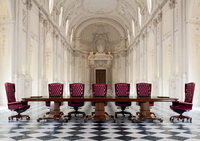
Western leaders need Putin like the sky needs the sun

An article posted in the publication says that as long as Russia refrained from invading Ukraine, started to withdraw troops from the Ukrainian borders and grudgingly accepted the results of the presidential election in the troubled country, it is obvious that Western leaders no longer want to raise the issue of sanctions against Russia and try to resume diplomatic contacts with the country instead.According to well-known US-based publication The Olympian, even though Russia did not participate in the G7 Summit, the country dominates over the leaders of world's powers, while the latter tend to resume contacts with the Russian president.
Indeed, Obama's promised sanctions were not adopted. French President Francois Hollande, German Chancellor Angela Merkel and British Prime Minister David Cameron intend to meet with the Russian President during the celebrations of the 70th anniversary of the Normandy landings. However, Obama himself does not plan to hold a tete-a-tete meeting with his Russian counterpart, although he said, for some reason, that he would try to persuade Putin to meet with Poroshenko.
According to the publication, the G7 members realize that they can not get rid of Putin, because they need his support in addressing other global issues of world security. For the United States, Russia remains a strategic challenge, although European countries that receive oil and gas from Russia are interested in doing business with Moscow, and they have never sought to specifically isolate Russia.
It is an open secret that Germany, for example, always wanted "a constructive dialogue with Russia," while France continues to build helicopter carriers for Moscow. To crown it all, global corporations and oil and gas giants say that they are not going to carry out previously adopted sanctions against Russia.
German Chancellor Angela Merkel supported France's plans to execute the contract for the supply of two Mistral helicopter carriers to Russia, despite criticism from the U.S., EUobserver reports.
It goes about the contract worth 1.2 billion euros for the construction of two French helicopter carriers for the Russian Navy. The contract was signed in June 2011 by Russian defense giant Rosoboronexport and French company DCNS. Russia's United Shipbuilding Corporation (USC) takes part in this deal as a subcontractor for French shipyard STX France in Saint-Nazaire.
Earlier, French President Francois Hollande said, after the first day of the G7 summit, that his country would fulfill the contractual obligations and deliver the ships to Russia in October. There are no measures in the second phase of anti-Russian sanctions that stipulate a possibility to terminate the contract. U.S. Secretary of State John Kerry stated that France's plan to execute the contract with Russia was raising concerns with the United States.
According to Merkel, the contract can be terminated only during the next step of sanctions against Russia, which involve economic restrictions.
"The issues affecting exports to Russia fall under the third phase of sanctions. With regard to the third stage, we agreed - and I personally agreed with the U.S. President - that if the elections in Ukraine take place, then we will not enact the third stage of sanctions. We have now seen that the elections were successful," said the Chancellor of Germany.
However, Merkel added that the third stage would be triggered, should the situation in Ukraine continue to destabilize.
According to RIA Novosti, a representative of Rosoboronexport reported that Russia strictly adheres to the current schedule of payments under the contract with France, while the French side sticks to the construction schedule. As expected, the first Mistral ship - "Vladivostok" - will be put into service in 2014; the second one - "Sevastopol" - in 2015. Both ships will be named after Russian cities. Noteworthy, Sevastopol is now a Russian city of federal significance in the Crimea, formerly a Ukrainian territory.